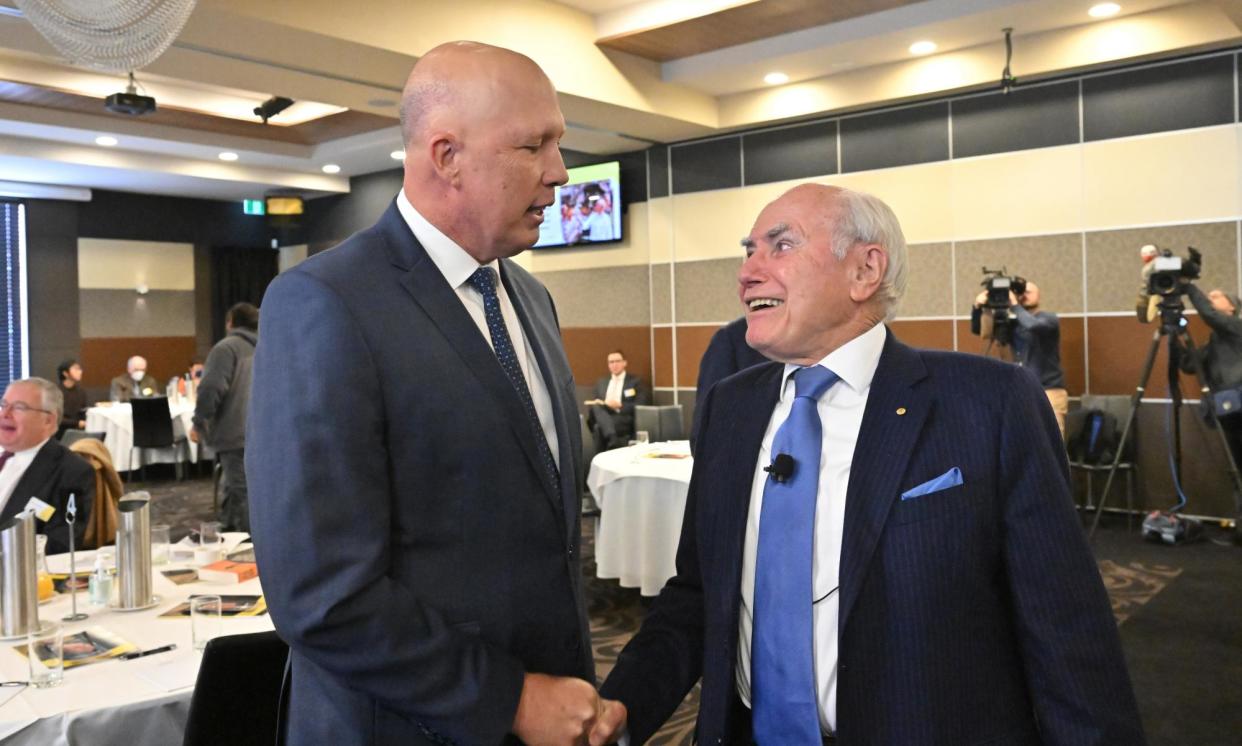Dutton is demanding Australia resist ICC arrest warrants for Israeli leaders – and a Howard-era law could help him

In 2002, a little-known backbencher by the name of Peter Dutton rose in parliament to ask the then prime minister, John Howard, about a new mechanism for prosecuting war crimes.
The newly elected member for Dickson’s dixer to Howard was straightforward: “What is the basis of the government’s decision to ratify the statute of the International Criminal Court?”
Twenty two years later, Dutton has threatened to cut ties with the ICC amid warnings Australia could be required to detain the Israeli prime minister, Benjamin Netanyahu, if the court issues a proposed arrest warrant and he travels to Australia.
Related:Peter Dutton wrong to claim Australia was consulted on ICC pursuit of Israeli leaders, Labor says
But it has emerged that a carve out - baked into law by the Howard government – gives the attorney general of the day wide discretion on whether to comply with such requests.
Howard was seeking to allay concerns from a wary Coalition party room and assured Dutton and other MPs at the time that Australia’s sovereignty was not under threat.
“There is a further, very important stipulation that no Australian can be surrendered or no warrant can be issued for the arrest of an Australian citizen under the statute without the prior consent of the attorney general,” Howard said in his answer to Dutton on 20 June 2002.
In fact, experts say that the wording of the legislation Howard brought forward was broader than solely protecting Australians from being surrendered to face trial before the ICC in the Hague.
It says the attorney general must not act on an ICC request to arrest or surrender a person “unless the attorney general has, in his or her absolute discretion, signed a certificate that it is appropriate to do so”. This discretion is not limited to Australian citizens.
Don Rothwell, an international law expert at the Australian National University, says this “remarkable provision” suggests the attorney general’s view can’t be challenged in court.
Rothwell says the provision is “sufficiently broad that the attorney general could exercise such a discretion to ensure that an ICC arrest warrant is not acted upon in the case of certain persons where the Australian government of the day took the view that the arrest warrant had no merit”.
“It was sufficient for the Howard government to win over doubters in the party room and Australia became an original party to the Rome Statute on its entry into force on 1 July 2002,” Rothwell says.
Related: Spying, hacking and intimidation: Israel’s nine-year ‘war’ on the ICC exposed
The issue has roared back onto the domestic political agenda in the past two weeks after the ICC’s chief prosecutor, Karim Khan KC, announced he was seeking arrest warrants for two Israeli leaders and three Hamas leaders.
Khan said he had “reasonable grounds to believe” Netanyahu and the Israeli defence minister, Yoav Gallant, bore criminal responsibility for alleged war crimes and crimes against humanity, including “starvation of civilians as a method of warfare”.
The Israeli government has rejected the allegations, arguing the move amounts to an attempt to deny the country’s right of self defence to the Hamas attacks of 7 October.
An Israeli government spokesperson called on allies such as Australia to “oppose the prosecutor’s decision and declare that, even if warrants are issued, you do not intend to enforce them”.
In a Senate estimates hearing on Thursday, officials from the attorney general’s department confirmed that Australia - as one of the ICC’s 124 member states - had “a general obligation to cooperate fully with the court and prosecutions”.
But under questioning from the Greens, officials also pointed out that the Howard government-era law, the International Criminal Court Act 2002, “provides for a discretion”.
Douglas Guilfoyle, a professor of law and international security at the University of New South Wales Canberra, explains Australia “has an obligation under international law to execute any ICC warrant it receives and surrender suspects to the court”.
“Obviously, failure to comply in practice would usually breach international law,” Guilfoyle says.
“But there may be cases where the attorney general has a genuine need for discretion, including cases where Australia may be faced with competing extradition requests from another state or states for the same suspect.”
Related: Labor backs ICC’s role in international law as other MPs condemn Israeli ‘war’ on court
The Greens senator David Shoebridge says the public “deserves a clear statement from the Albanese government that they either will, or will not, enforce an arrest warrant issued by the ICC”.
The office of the attorney general, Mark Dreyfus, declined to speculate on how he might exercise his discretion if the arrest warrants are approved.
But the key players from the 2002 debate have expressed outrage at the prosecutor’s move, with Howard denouncing what he saw as a “ludicrous” attempt “to morally match Hamas leaders with Benjamin Netanyahu”, while the then foreign minister, Alexander Downer, has said he felt “let down”.
“Unless this is somehow rectified, I think it’s the end of the International Criminal Court,” Downer told the Australian newspaper. Dutton, now opposition leader, has called for Australia to apply “pressure” on the ICC not to proceed.
The Albanese government has responded cautiously, but a spokesperson for the foreign minister, Penny Wong, says it is important that international law is upheld.
“Since John Howard ratified the Rome Statute in 2002, Australia has respected the International Criminal Court.”

 Yahoo News
Yahoo News 
